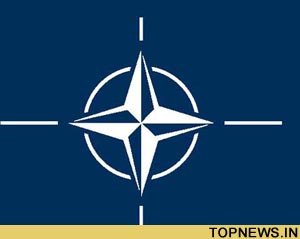Sixty-year-old NATO still insecure about security
 Brussels - The first thing visitors to the press centre at NATO's headquarters in Brussels usually see is a colossal mural stating that the alliance's "enduring purpose" is to guarantee its members' security.
Brussels - The first thing visitors to the press centre at NATO's headquarters in Brussels usually see is a colossal mural stating that the alliance's "enduring purpose" is to guarantee its members' security.
The second is a rather smaller notice outside the cloakroom warning them that NATO cannot guarantee the security of their valuables.
Clearly, not even the world's most powerful alliance can do everything - and 60 years after it was created, NATO's 26 members are desperately grappling with the question of what, exactly, their military club is meant to do. "We need to answer the question: what kind of NATO do we want for the years to come?" NATO Secretary General Jaap de Hoop Scheffer asked before the alliance's last summit in Bucharest in April. "The notion of security has changed. At the top strategic level, NATO has to have a debate on where its boundaries are," Peter Felstead, chief editor of influential journal Jane's Defence Weekly, told the German Press Agency dpa.
NATO was founded in April 1949, at the height of the Cold War, when the overriding security priority for Western nations was to stop the Soviets invading.
The best way to do that, NATO founders agreed, was to promise to all go to war if one of them was attacked - and then to amass so many tanks and nuclear bombs that nobody would dare threaten them.
"During the Cold War, it was easy for NATO to decide when to go to war: once certain limits were exceeded, a war would have followed automatically," Germany's former defence minister Volker Ruehe (served 1992-98), told a conference on the alliance's future in June.
But the collapse of the Soviet Union in 1991 removed the one overwhelming threat to NATO's security.
And the bloody disintegration of Yugoslavia in the 1990s, the terrorist attacks on New York on September 11, 2001, and the occupation of Afghanistan, which NATO now leads, have all left the alliance facing the uncomfortable truth that the threats it faced have changed beyond recognition - and that NATO will have to change to cope.
"NATO used to be an alliance that waited to be attacked and was essentially passive. Now, NATO is asked to act actively, and this is much more demanding and controversial than simply being in a reactive mode," Jamie Shea, director of policy planning at NATO's headquarters, said.
NATO has certainly changed from the distant days when its main job was to point lots of heavy artillery East.
Today, the alliance has 62,000 men trying to pacify and rebuild Afghanistan, 15,000 men making sure that Kosovo does not fall back into civil war, and several ships patrolling against pirates in Somalia.
On top of that, it has already set up 12 "centres of excellence" aimed at working out what battles it will have to fight in the future and teaching member states how to fight them.
They include centres on civil-military cooperation (in the Netherlands), bomb disposal (Slovakia), fighting in shallow water (Germany) and cyber-defence (Estonia) - not to mention NATO's own TV channel, www. natochannel. tv.
"NATO was essentially an agency for stabilizing Europe. Now, NATO is much more an agency for transforming the rest of the world," Shea said.
NATO leaders are now busy drawing up a new "strategic concept" on issues as diverse as terrorism, nuclear proliferation, climate change and cyber-warfare, which they hope to approve at their next summit in Strasbourg on April 3 and 4.
That document is intended to answer the key question which de Hoop Scheffer and many other top officials have asked in recent years: what does NATO want itself to become?
De Hoop Scheffer has already provided what he sees as the answer: a combination of new forms of warfare, better cooperation with civilian powers, especially the European Union, more efficiency and a bigger budget.
But with NATO now taking on so many security challenges in so many different areas, analysts warn that any document will only be the beginning, not the end, of the process.
"There have been quite a few seismic shifts since the end of the Cold War, and NATO is going to have to slowly adapt to them. I don't think there's going to be a quick fix," Felstead said. (dpa)